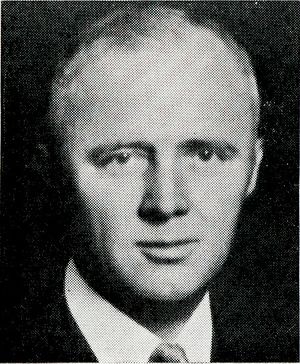William B. Kouwenhoven
- Birthdate
- 1886/01/13
- Birthplace
- Brooklyn, NY, USA
- Death date
- 1975/11/10
- Associated organizations
- Johns Hopkins University
- Fields of study
- Power
- Awards
- AIEE Edison Medal
Biography
William Bennett Kouwenhoven, a pioneer in understanding electricity and the heart, was born on 13 January 1886 in Brooklyn, NY. His greatest achievement was the development of the closed-chest electric cardiac defibrillator, which was used for the first time in the 1950s to save a human life, and has since been used to save thousands more.
A look back at Kouwenhoven's life suggests the diversity out of which modem biomedical engineering emerged. Dean of Johns Hopkins Electrical Engineering School from 1938 to 1954, Kouwenhoven was an IEEE Fellow, recipient of the Edison Medal in 1961 "For his inspiring leadership in education, for his contributions in the fields of electrical insulation, electrical measurements, and electrical science applied to medicine, and especially for his investigations of the effects of electricity on the human body with the successful development of countershock for the cure of fibrillation of the heart", and the Power Life Award, and prolific author of technical publications. He was also recipient of the Albert Lasker Medical Research Award, one of the medical profession's highest honors.
Kouwenhoven originally devised the closed-chest defibrillator, a project he began in 1950 for the Edison Electric Institute, for power companies to use in resuscitating workers who had been electrocuted in the field. In addition to that, he founded closed- chest cardiac massage, now known as CPR (cardiopulmonary resuscitation, which includes massaging the lungs as well as the heart), which is used to sustain a heart- beat after cardiac arrest by using only the hands. It was not just in electricity's healing power -as in the life-returning jolt of the external defibrillator- that Kouwenhoven worked, however. In part through grants from the Edison Electrical Institute, various power companies, and the National Heart Institute, Kouwenhoven investigated the health effects of high voltages on installers of power lines across the country. He studied autopsy reports for every case of death by electrocution in the country and was a leader in establishing electrical safety standards.
Kouwenhoven received his B.E. from Brooklyn Polytechnic University in New York City, and his Ph.D. from the Karlsruhe Technische Hochschule in Germany in 1913. After he retired as dean of electrical engineering a Johns Hopkins in 1954, he was given use of a laboratory in the medical school, from where he made some of his most impressive advancements. He was the recipient of the Albert Lasker Award for Clinical Medical Research. He died on 10 November 1975.
Photographs

